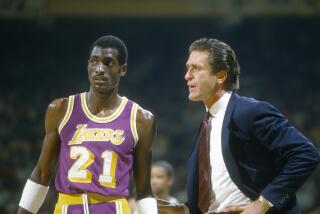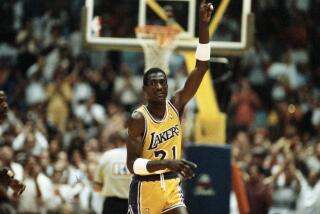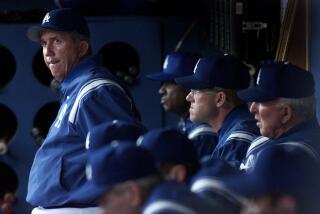Hayes, Bing, Monroe in Hall of Fame : Basketball: Neil Johnston, a scoring champion in the 1950s, is also selected for May 15 induction.
SPRINGFIELD, Mass. â Elvin Hayes, Dave Bing and Earl (The Pearl) Monroe were elected to the Basketball Hall of Fame on Thursday.
Also chosen was the late Neil Johnston, the Philadelphia Warriorsâ hook-shot artist who led the NBA in scoring for three consecutive seasons in the early 1950s. All will be inducted on May 15.
Hayes, who starred at the University of Houston in the late â60s and ended his 16-year NBA career as the leagueâs third-leading all-time scorer, said making the Hall of Fame is a dream come true.
âItâs just unreal,â Hayes said. âItâs just like winning your first high school basketball championship or your first NBA championship. Itâs just one of those feelings. You work so hard and have your dreams and then it happens.â
Hayes, who played for the Rockets in San Diego and Houston, and the Bullets in Baltimore and Washington, was the NBA rookie of the year in 1969, when he led the league with 28.4 points a game.
He averaged 21 points and nearly 12.5 rebounds a game for his career and was named to 12 All-Star teams. He was the leagueâs top rebounder in 1970 and 1974.
Monroe, rookie of the year for Baltimore in 1967-68, averaged 18.8 points in 12 seasons with the Bullets and New York Knicks, who he helped to the 1973 NBA title.
Bing was rookie of the year in 1966-67 with the Detroit Pistons. He led the league in scoring, averaging 27 points a game the next season. He averaged 20 points and nearly six assists during his 12-year career with Detroit, Washington and Boston.
During eight seasons with Philadelphia, Johnston led the NBA in scoring in 1952-53 and 1953-54 and in both scoring and rebounding in 1954-55. He was named to six All-Star teams before a knee injury ended his career in 1959.
More to Read
Go beyond the scoreboard
Get the latest on L.A.'s teams in the daily Sports Report newsletter.
You may occasionally receive promotional content from the Los Angeles Times.










